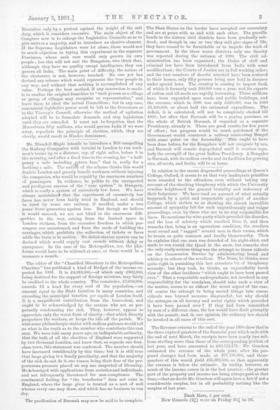The pacification of Burmah may now be said to be
complete. New Consols (2!) were on Friday 952 to 96.
The Shan States on the border have accepted our suzerainty and are at peace with us and with each other. The guerilla, bands in the sixteen civil districts have been gradually sub- dued; and though in one or two they still give signs of life, they have ceased to be formidable or to impede the work of government. In the three worst districts only one dacoity was reported during the autumn of 1890. The civil ad- ministration has been organised ; the Codes of civil and criminal law have been introduced from India with some modifications ; the Courts of Justice are in full working order; and the vast numbers of dacoits arrested have been restored to their homes, only fifty persons being now held in durance under special laws. The country is ceasing to import food, of which it formerly took 200,000 tons a year, and its exports of cotton and oil-seeds are rapidly increasing. Three millions have been expended upon roads and public buildings, and the revenue,, which in 1886 was only £220,000, was in 1890 £1,100,000, or about half the estimated expenditure. The deficit, it is calculated, will not be completely choked till 1900; but after that Burmah will be a paying province, as the whole of British Burmah, if regarded as a separate Presidency, already is. These are good results for five years of effort ; but progress would be much quickened if the Government would construct a railway connecting Bengal with some point on the Irrawaddy. This ought to have been done before, for the Bengalees will not emigrate by sea, and Burmah will remain depopulated until it receives regu- larly the overspill of the great Indian Presidency. A Bengalee in Burmah, with its endless creeks and its facilities for growing rice, oil-seeds, and fruits, will be at home.














































 Previous page
Previous page